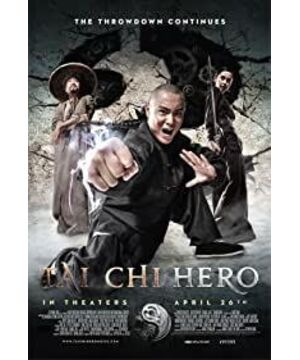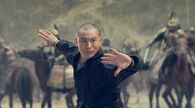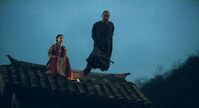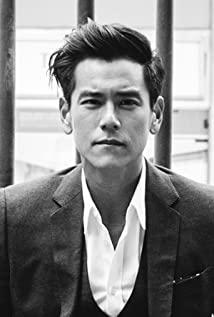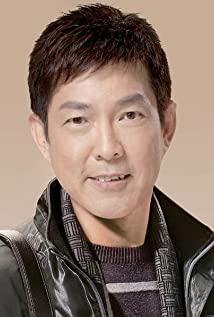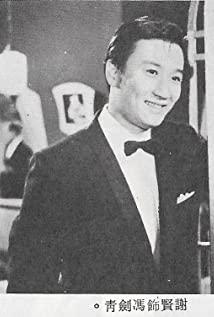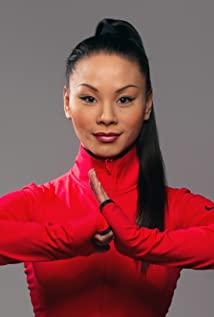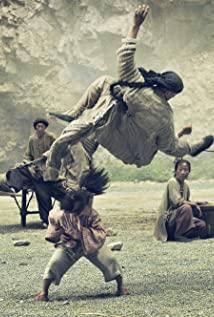But since there is a "2", let's compare it with the previous episode.
I think "Tai Chi 1" is a good-looking weird movie. Although the plot is weak, the "messy collocation" of hip-hop, rock, anime, video game, and even punk style makes me think "Tai Chi 1" Very happy and beautiful. However, from the point of view of "Tai Chi 2", the wind of mixing and matching is much less. It is different from the intensive appearance in the previous episode. Some weird elements in this episode only play a decorative role and are not the protagonist. In fact, "Tai Chi 2" is more like a traditional martial arts film, because the overall style is more serious than the previous episode. In other words, Feng Delun is obviously restrained in the production of the next episode. This gave me the feeling that Feng Delun, who was having a good time, wanted to take some snacks and tell the story of a master's growth in a down-to-earth manner. As for whether you like this kind of convergence, I think it's a matter of opinion, at least, I don't reject it.
Story-wise, the second episode is a little more twisty than the first, but it's just taller than short. Although I like "Tai Chi", the plot of these two episodes can only be said to be qualified at best. The breakthrough of the second episode compared with the first episode is that there are finally some unpredictable elements, which of course all benefit In Feng Shaofeng. The addition of the role of Feng Shaofeng makes the film a lot fuller. This fullness is not only in the plot, but also in the interior of the film.
The most dissatisfying thing about "Tai Chi 1" is the machine monster that sees for the sake of vision. In my opinion, this machine monster is a dispensable object born purely to create contradictions, so although I liked "Tai Chi 1" at the time Tai Chi 1", but I am really worried that this film will eventually become a "spiritual opium" film. I am worried that in the second episode, Feng Delun will indulge in creating a black-and-white extreme and narrow contradiction such as "beating foreigners". Chinese kung fu and industrial civilization are simply opposed to each other. And that's exactly what surprised me about the second episode.
It can be said that it is precisely because of the little thinking and slightly complicated plot settings in "Tai Chi 2" that the entire "Tai Chi" finally did not become a completely narrow self-hypnotic film. Although the film exaggerates the power of Taijiquan, the interpretation of the relationship between Chinese Kungfu and industrial civilization tends to be rational. The contradiction between the two was handled by Peng Yuyan in the first episode, and continued to be carried forward in the second episode. At the same time, the film emphasized the complementarity of the two. The appearance of Feng Shaofeng completed this task - the two Unification, which seems to have some echoes with the title of "Tai Chi", or in other words, the meaning of fusion in "Tai Chi" has more derivatives. This delicate relationship, which is both antagonistic and complementary, was vividly displayed in the battle at the entrance of the village, and the theme of the film was sublimated to a certain extent at that moment, even if this sublimation seemed so insignificant for a commercial film.
Because the film puts a lot of brush and ink on the eldest brother played by Feng Shaofeng, and the need for the growth of the protagonist, the rhythm of "Tai Chi 2" is slow, and the fighting scenes are not as intensive as the previous episode. However, despite this, the final kitchen battle It is still a classic among kung fu films in recent years. Under the training of Sammo Hung, Yuan Xiaochao and Yuan Biao, two trainers, played a very colorful part. It can even be said that this part is also the most exciting part of Sammo Hung's martial arts works in recent years. I really enjoyed it. . It's just a pity that, in order to accommodate the last climax of the fight scene, the first paragraph was slightly slow and full of plot, but at the end there was a hasty and thinner ending, which was a bit anticlimactic. This is somewhat traditional. The old way of kung fu movies - where everything ends with a fight - is a bit of a shame, but that's about all it seems.
Well, I look forward to this movie continuing.
View more about Tai Chi 2: The Hero Rises reviews


